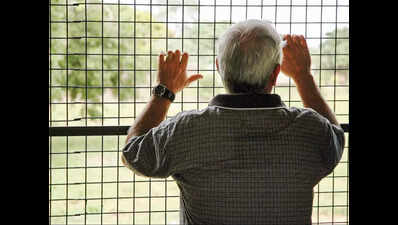ARTICLE AD BOX

HYDERABAD: Although around 90 psychiatric patients at the Institute of Mental Health (IMH), Erragadda, have recovered and are deemed fit for reintegration into the community, many continue to remain in the hospital’s discharge and cure (DC) ward.Doctors at the IMH report making 25 to 30 phone calls daily to the families of such patients, but to no avail. Relatives or next of kin often refuse to take them back, despite medical clearance.One such case involves a 45-year-old man from Sirpur who was admitted with bipolar affective disorder (BPAD) in December 2023 and declared fit for discharge in April 2024. However, the father of a 15-year-old boy is now being abandoned by his family.
A month ago, he also developed a fever and subsequently suffered paralysis.
“During his admission, his relatives came along, but now they claim it is his son’s responsibility to bring him home. Although his psychiatric condition has improved, he currently has slurred speech (difficulty to pronounce words clearly) and an abnormal gait (change in walking pattern). He needs neurological treatment, but the family refuses to accept him,” said Dr Vivaswan Boorla, psychiatrist at IMH.
On average, patients are recommended for discharge within three to four months, unless they have a chronic mental illness, in which case treatment typically lasts six to seven months. Most of the patients suffer from conditions such as schizophrenia, bipolar disorder, and other psychological illnesses.OVERUSE OF HOSP RESOURCESTelangana currently has two mental health review boards (MHRBs), which oversee discharge procedures via dedicated committees.
While some recovered patients have been placed in care homes run by non-profits, this is only permitted through court orders. The situation is also contributing to the overuse of hospital resources and adding strain to IMH’s 600-bed capacity.“Beds and other resources continue to be occupied by patients who are already fit for discharge, even as new patients are admitted regularly. This often results in a shortage of space and puts additional pressure on the hospital staff,” said a senior doctor.Moreover, due to extended stays, many recovered patients in the DC ward begin to develop general health issues such as fever, cough, hypertension, and diabetes. “These patients need to be taken to specialists at Osmania General Hospital (OGH) and other facilities, usually accompanied by a staff member in an ambulance. This adds further pressure on our staff,” the doctor added. Several of these patients were also taken ill during the food poisoning incident at IMH in early June.Citing the Mental Healthcare Act 2017, IMH superintendent Dr Anitha Rayirala emphasised that the law mandates the reintegration of recovered psychiatric patients into society. She added that the primary aim of the revised Act was to uphold the rights of individuals with mental illness, who were frequently abandoned in the past.“The patients in DC wards have been granted the status of free citizens on court orders.
Yet, there remains a widespread belief among family members that these individuals are still unwell, even when they are stable and doing well post-treatment. Another issue is that families often stop administering medication after discharge, leading to relapse.Family UnwillingA 46-year-old man from Pedadapally was admitted to the IMH in June 2019 following a magistrate’s order and was declared fit for discharge in October 2020.
According to doctors, the patient had discontinued his psychiatric medication on his own, claiming he was asymptomatic and no longer required treatment.However, due to his history of aggression and the potential risk he poses to his elderly parents, particularly in light of his mother’s medical condition and his father’s caregiving responsibilities, the family has expressed their unwillingness and inability to take him back home post-discharge.Fears Of RelapseIn another case, a 36-year-old man from Mancherial diagnosed with bipolar affective disorder (BPAD) was admitted to the IMH in September 2024 and declared fit for discharge two months later. Despite repeated calls, his family members have expressed reluctance to take him home, citing fears of a potential relapse. While they assured the patient over the phone that they would visit soon, they have since informed the doctors that they do not intend to come.



.png)
.png)
.png)
















 5 hours ago
5
5 hours ago
5









 English (US) ·
English (US) ·